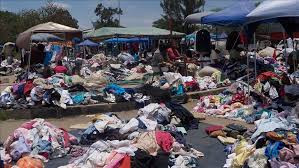
HARARE residents have expressed outrage over government’s sudden ban on second-hand clothes trade in the capital, calling it an “autocratic onslaught” against livelihoods.
On Monday, Local Government and Public Works minister Daniel Garwe announced an immediate prohibition on the importation of second-hand clothes and night vending in Harare’s central business district (CBD).
The move has drawn sharp criticism, with economists warning it could negatively impact Zimbabwe’s gross domestic product.
According to the Zimbabwe National Statistics Agency, 76,1% of operational businesses in the country are informal.
In a strongly worded statement, Combined Harare Residents Association (CHRA) chairperson David Pasipanodya condemned the ban as a violation of the devolution principle under section 264 of the Constitution.
“The ministry’s intervention reflects a failure to implement devolution properly,” he said.
“Decisions affecting Harare should be made by the local authority, not imposed autocratically.”
- Harare cancels Pomona waste deal
- Pomona cash row escalates
- News in depth: Zimbabweans choke under weight of worsening service delivery failures
- Stop harassing media for reporting truth
Keep Reading
Pasipanodya emphasised that the informal sector has for long been complementing the formal economy.
He warned that the ban would devastate thousands of people who rely on informal trade, especially given the lack of authorised vending spaces in the city.
“The economy has already forced many into informal trade,” the CHRA chairperson said.
“This ban attacks their only means of survival without offering alternatives.
“The government must first address the root causes pushing people into informal work.”
He urged authorities to devolve decision-making to councils, consult the Small and Medium Enterprises ministry and engage directly with affected traders.
Meanwhile, government has given vendors a one-month ultimatum to clear their stocks and vacate the CBD before enforcement begins.










